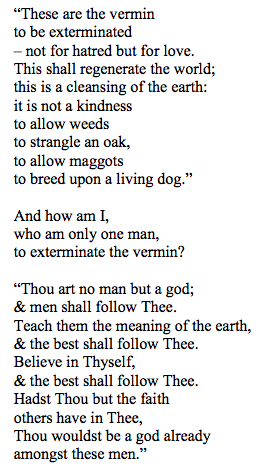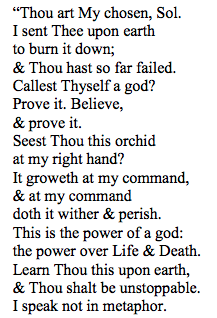Augustus Sol Invictus is a self-proclaimed “god” who kills goats and has serious issues with women
On the laundry list of out-and-proud white supremacists headlining the Unite the Right rally this weekend in Charlottesville, Virginia, which of these is not like the others?
Augustus Sol Invictus is a misfit of the bunch for many reasons. For one, he has so far tried to conceal his racialist and anti-Semitic worldview with euphemisms and rhetorical deceptions, lately relying on a vague, palingenetic call to “restore the Republic.” When Invictus takes the stage this Saturday, it will just be the latest event in a long line of appearances alongside avowed white nationalists.
Since rumor has it the former Libertarian Senate primary candidate intends to announce another run at public office — this time as a Republican — those associations are more disturbing than ever. But with Invictus, voters have a lot more to worry about than just dog-whistle bigotry.
His abstract oratory about the glory of battle or the violent enforcement of a “natural” hierarchy only hints at the darker ideas that underpin his totalitarian worldview. That worldview is defined by an incomparable narcissism that transcends political ideology and casts Invictus as a hero, a prophet and a conqueror—even, as he himself has suggested, a god—in his own mind.
His egotistic illusions of himself as a transformative, historic force are troubling on their own. But worse, their distinctive Hollywood alpha-male quality reflects a toxic disdain for women. Though he publicly denies being a misogynist, his dealings with women over the past four years reveal public harassment, denigration and, as recent allegations suggest, violent abuse.
“THIS IS WHAT I THINK OF YOUR HUMANITY, W----”
In March, Invictus’ former girlfriend filed a report with the police in Edgewood, Florida. In the statement she gave authorities, she described multiple episodes of physical and psychological abuse wherein Invictus allegedly beat, choked and sexually assaulted her, and held a gun to her head. During one incident, he allegedly smashed her face into the center console of a car repeatedly, and then tried to push her out of the vehicle while it was still moving. She also said he plotted out a block on his online calendar where he threatened to “annihilate” her. Invictus initiated a relationship with her in 2015, when she was still a high school student. He was 32.
When asked whether the allegations of violence were true, Invictus told Hatewatch, “Categorically, no.”
He also said he never harassed a woman or sought revenge after a breakup. But a friend of Invictus’ from the Ordo Templi Orientis (O.T.O.), to which Invictus once belonged, remembers things differently.
Most of the sources approached for this story requested that they remain anonymous, each saying that they feared retaliation from Invictus or his supporters. His friend from the O.T.O. described vicious diatribes Invictus posted to social media after ending one relationship.
“He was on Facebook constantly, saying the most awful, disgusting things about her,” the friend said.
Hatewatch obtained screenshots of one of those attacks, a note posted to Invictus’ Facebook page on January 7, 2013, titled “THIS IS WHAT I THINK OF YOUR HUMANITY, W----.” In it, he threatened, “Mark my words -----, I will be the end of you.”
He concluded the lengthy tirade, “F--- you, -----. Kill yourself, you worthless piece of shit.”
In that Facebook post, Invictus admits to and attempts to justify stealing his then-girlfriend’s phone and snooping through it for evidence of disloyalty.
Apparently, spying on romantic partners is a tough habit to break. This June, right after speaking at the D.C. rally for free speech, Invictus went to New York to appear on Gavin McInnes’ radio show. He stayed with Ashley Kopf, a woman he’d met online and had been flirting with for about a month.
Kopf recalled that he had no money and she had to pay for all his expenses during his stay. He was only at her apartment for two nights, but before he left he’d managed to discover her phone password, break into her phone while she was sleeping and pry through her texts, photos and emails.
“When somebody goes into your personal, your private belongings like that, that’s very unnerving,” she said.
Early on, Kopf started to get the sense that he wasn’t as charming as he pretended to be on social media. A few days before he arrived, he became furious after discovering she had a male roommate. Invictus demanded she make sure the roommate was out of the apartment during his stay. She obliged, but Invictus was still fuming. When Kopf asked what she could do to appease him, she received a disturbing reply.
“Get MDMA, hydrocodone, and your girlfriend for Monday night,” Invictus said via text message. “Maybe then I’ll calm down, after we release some tension.” Kopf did not comply with the bizarre demands—which are also notable because Invictus has claimed he quit both polyamory and drugs.
Invictus’ contempt for women is apparent in his creative writing as well. Sexual objectification and sexual violence are recurring themes in his prose and poetry. He wrote a book called “Il Tempio Florido,” under a pen name and a pseudonym he used personally at the time, Franco St-Fond. Much of the novella reads like immature, clumsy erotica, featuring lines like, “An orgy was raging as we stepped in the door, and Adriana hesitated not to beeline for the white-mounded glass table betwixt cohorts of maniacal titty-f------.” But in the most disturbing passage, the main character—also called Franco St-Fond, and who shares many biographical details with Invictus, including his age and birthday—perpetrates the graphic rape of a crying 14-year-old girl.
His poetry includes such lines as “Jägermeister at Dexter’s is all fun and games—until the wild will to rape every b---- at the bar like a sea swell begins to rise,” and, “When I say ‘I love you,’ it means I want to impregnate you with the future of Europe.” One poem describes a sexual partner as, “Trembling, covered in sweat, terrified, submissive.”
“I’m not human”
Abuse of any kind, be it emotional, physical or psychological, typically implies a feeling of superiority and entitlement. But in his claims to power and supremacy, Invictus aims a little bit higher than your average narcissist.
That’s not entirely surprising, coming from a man who would name himself “majestic unconquered sun.” Invictus got his name legally changed from his birth name, Austin Mitchell Gillespie, in 2006. He avoids saying he chose the name. Saying, “it was given to me,” he endows it with the mystical weight of destiny that he’s tried to apply to every aspect of his life. But he’s said the process is akin to Catholic confirmation, in which recipients of the sacrament do in fact choose their names, based on a saint with whom they feel a special affinity.
Some of Invictus’ self-aggrandizement is mundane. For example, he’s called himself a genius in speeches and writings, including the notorious renunciation letter where he abandons his earthly possessions and forfeits his U.S. citizenship. But beginning with that letter, his egotism begins to make a distinctly supernatural shift, and he starts to refer to himself in writings as a prophet and a divine warrior sent by the gods.
In 2013, the same year he hitchhiked to the Mojave on his pilgrimage, he sent an email to his religious association declaring himself an Ipsissimus. In Aleister Crowley’s A∴A∴, an Ipsissimus is the highest possible achievement, equivalent to a god among men.
Some in his order were very unhappy about his claims. Crowley expressly forbade any Ipsissimus from revealing their status to anyone. Some Thelemites interpreted the move as blasphemous, attention-seeking behavior. It wasn’t the only time he and his fellow believers butted heads.
“I’m sure you’re aware of some of the crossover between fascism and the occult, but that’s always been his thing,” said Invictus’ friend from the O.T.O. “His understanding of Thelema was always a little perverted.”
One of the more macabre subjects on which Invictus took a stand was human sacrifice. In a letter to the O.T.O. after his membership was terminated, Invictus confirmed that he had “spoken of it favourably to a Brother,” and defended his reasons for doing so. After returning from his pilgrimage, he got a real taste of what sacrifice felt like when he filmed himself slaughtering a goat as an offering and drinking its blood. According to two of his former associates in the O.T.O., the killing was botched, and the goat suffered a drawn out, brutal death.
When Invictus announced himself a god to his order, he also circulated a 220-page poem, which he decreed was a new sacred text for the religion of Thelema, right up there with some of Crowley’s most important work. The poem, “Aeon,” documents a 30-day vision quest exploring the Enochian Aethyrs, in which the gods praise Invictus’ divinity and outline his destiny. It’s similar to much of what he talks about in his speeches today—bringing about a Great War, restoring the “Ancient Ways” and exterminating those he deems unworthy. It ends with a vision that Invictus interprets to be the future, with Invictus at the center of group of disciples, playing the role of Jesus in a scene that openly imitates the Last Supper.
“He's just delusional and thinks he's on some great quest,” said a friend who was close to Invictus at the time he was declaring himself a god. “He sees himself as this one day triumphant hero. He's obsessed over it.”
Though Invictus’ friend in the O.T.O. was offended at the time, he also interpreted these actions as part of a larger, elaborate pattern to conceal what he perceived to be feelings of vulnerability.
“At his core he is a highly emotional, insecure person who has learned to manipulate the people around him very well,” he said.
Whatever it was that motivated Invictus to claim some otherworldly power at the time, he still had faith in his omnipotence when he stayed with Ashley Kopf.
On his first night at her apartment, he became ill and vomited in her bathroom. Kopf thought it might have been due to his strict paleo diet and cautioned him, “You know, you need your nutrients. Maybe you’re sick because you’re a human being and you need to eat normal food.”
“And he was like, ‘I’m not human,’” Kopf recalled. “And I was like, ‘What do you mean, you’re not human?’ And he just was like, ‘I’m not human.’…He kind of shut down at that point. He seemed very offended by it. By me saying that he was a human. It was like an insult or something.”
“Greatness is not content with metaphor”
When first confronted with Invictus’ outlandish persona, it’s hard to know what to make of it, from the peculiar, affected accent that comes and goes, to the “thee’s,” “thou’s” and “verily I say unto you’s” that creep into his speeches now and again. That’s not to mention his recent affinity for the tough-guy leather jacket and his noble attempt to make Madonna’s fingerless gloves great again. His content is so far beyond hyperbole, his delivery so campy, that you have to wonder: Is this all just some elaborate piece of performance art?
Unfortunately, the man who has the potential to pull off the lengthiest, most dedicated troll ever against the Alt-Right appears to be doing anything but. He’s clung to these ideas about war, glory and destiny for years, and now he’s just seizing a platform. For what it’s worth, he told Hatewatch he’s been having premonitions about his Great War in his dreams for as long as he can remember.
In 2013 he wrote a letter to the O.T.O. that opened, “Greatness is not content with metaphor.” More than anything, Invictus wants to be able to see himself as great. He’s taken a lot of shortcuts to get there — choosing a name that’s basically a pretentious synonym for “great,” for one — but that doesn’t mean he’s messing around. He talks of hanging leftists from lampposts in a “literal revolution.” And the smart money says to take him at his word — at the very least, to believe that he believes.
“What’s disturbing about him is he blends these ideas with a very exalted idea of himself,” said someone who knew him when he was in law school. “Those kinds of people, they want to do something spectacular to show the world that they are a part of history, and those acts are often very evil.”
A close friend from college agreed. “I don’t think Augustus will allow himself to just fade into any kind of a background,” she said. “I completely think that at some point in time he will decide that enough is enough and test his limits.”



